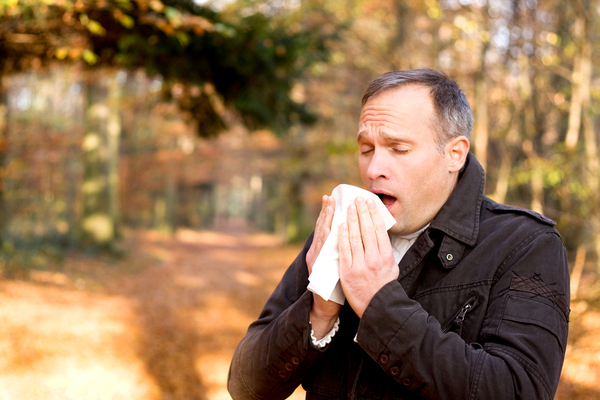Over the past year and a half of the pandemic, you’ve probably spent more time indoors than you ever have before. But when you and many other people in the country start stepping out to enjoy the fall weather, don’t be surprised if your allergies feel worse than usual this year. According to Yahoo Life, it’s not in your head — allergists say that it can definitely feel like this allergy season is more intense than usual. “Sheltering in place and mask-wearing during the COVID pandemic may have prevented exposure to airborne allergens, which cause allergic rhinitis,” says allergist and immunologist Dr. Patricia Takach, an associate professor of medicine at Penn Medicine.
So, while you more than likely wore a face mask outdoors last year, you may not be wearing one as often while outside this year, since the Centers for Disease Control and Prevention (CDC) states that — with some exceptions — you don’t need to wear a mask in most outdoor settings. As a result, though, you’ll be exposed to all of those fall allergens that can trigger your allergy symptoms — even though you largely missed them last year. “You may not be used to the exposure,” Dr. Purvi Parikh, an allergist and immunologist with Allergy & Asthma Network in New York, said in the interview with Yahoo Life. Cue even more runny noses, sneezing and stuffiness.
It’s also entirely possible that you’re simply having a worse time after staying home last year, which helped reduce exposure to fall allergens. “Allergy symptoms can actually get worse after re-exposure to an allergen you haven’t been exposed to in a while,” Dr. David B. Corry, professor of pathology & immunology and medicine and vice chair for immunology at the Baylor College of Medicine. According to the American Academy of Allergy, Asthma and Immunology, when you have an allergy, your immune system “overreacts to an allergen by producing antibodies called Immunoglobulin E (IgE)…. These antibodies travel to cells that release chemicals, causing an allergic reaction,” which leads to telltale allergy symptoms like a runny nose.
Surprisingly, frequent exposure to allergens can actually partially lower the amount of these triggering antibodies in your bloodstream. But when you haven’t been exposed to those allergens in a while — say, because you’ve been spending a lot of time indoors — the IgE levels can build up, causing even worse allergy symptoms the next time you’re exposed. You also need to realize that while it may seem like you’re having worse symptoms in the past, even if you actually aren’t. “It is certainly possible to experience apparently more extreme symptoms when, in fact, your reaction is the same as before, as a psychological result of just not having had allergy symptoms in a while,” Corry says. And, if you stopped taking your preventative allergy medication because you assume you’d feel good like last season, that can also make things worse, Parikh points out.
If you find yourself living in fall allergy-induced misery, there are a few things you can do to get relief. One is easing your way into spending more time outdoors, rather than suddenly spending long stretches of time outside. “If you’re already feeling symptoms, it might not be a good idea to spend a prolonged period of time outside,” says Dr. Ted Kelbel, section chief for allergy and immunology at Spectrum Health. Kelbel also recommends keeping your windows closed and running your air conditioner, particularly at night, so you don’t end up breathing in allergens while you try to sleep.
Takach suggests a few more hacks to ease your symptoms:
- Wash your face after you’ve been outdoors.
- Use a saline nasal spray to remove allergens from your nose.
- Wash your hair at night to limit bedtime exposure to allergens.
Finally, if fall allergies are a consistent issue for you, seeing a board-certified allergist is important, Parikh says, and ideally, before fall allergy season starts. That way, she explains, you can get started on appropriate preventative medications for your allergies to raise the odds you’ll feel comfortable once the season really gets going.
—
Photo Credit: Peggy Blume / Shutterstock.com
